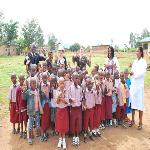The Global Partnership for Education has launched a three-year effort to put 25 million children in the classroom for the first time and train 600 thousand teachers. It calls education one of the most important investments a country can make in its people and its future.
The partnership recently awarded nearly 170 million dollars in education grants to seven developing countries. It was the first round of grants since the organization changed its name a few months ago from the Fast Track Initiative. Fast Track was founded in 2002.
"It was clear to us that there had been a lot of evolution of the old Fast Track Initiative, which was essentially something of a donors' club, I think. And what was clear from our perspective that we were not just a funding entity. This was indeed a partnership," said Charles Tapp, the global partnership's senior replenishment advisor.
That partnership includes nearly 50 developing countries, as well as donors, civil society groups, teacher organizations, the private sector, international development banks and U.N. agencies.
"It really was time to project the concept of the depth and the power of this quite extraordinary partnership, which is now developed to forward the cause of education in the poorest countries of the world," said Tapp.
The latest grants were awarded to Afghanistan, Ivory Coast, Guinea-Bissau, Mali, Moldova, Mongolia and Timor Leste.
The grant to Afghanistan is worth more than $55 .5 million..
"(The) Afghanistan government has made a very strong commitment of allocating as much of its own resources as it can for education. Historically, Afghanistan has had some very, very well educated people. (They) tend to come from sort of the urban centers, but obviously given the recent troubles and problems in Afghanistan over the last 20 years or so the quality of education has plummeted," he said.
Ivory Coast received a 41 million dollar grant to help in its recovery from recent political violence. The fighting left many dead and hundreds of thousands displaced.
Tapp said, "One of the key areas that we're actually providing support for under this program is actually looking to build and also repair classrooms, provision of textbooks. And another thing that we're looking at has been working with the government to try and get school feeding programs in place. You get a number of areas of Cote d'Ivoire with very, very poor nutritional standards."
More poor countries are now seeking help from the partnership.
"Unfortunately," he said, "given the current global financial climate and the fact that there are still 67 million kids out of school around the world demand for our financing seems to be increasing rather than decreasing."
With many donor countries are cutting back on spending, Tapp said the Global Partnership for Education must prove education is a good investment.
"Essentially I think the fundamental thing that is important to do is actually to be able to show people who are providing financing that their funds are achieving success. And it's very clear that in the global partnership partner countries that you're seeing more kids getting to school for longer and for a better education. So, primary school, completion rates are going up," he said.
Tapp also said as education improves so does the health of a country.
The Global Partnership for Education plans two rounds of grants in 2012. The first is scheduled for May or June and the next in November.
At the recent high-level conference on aid effectiveness in Busan, South Korea, the country's prime minister said one of the most important factors in his country's success is better education.
